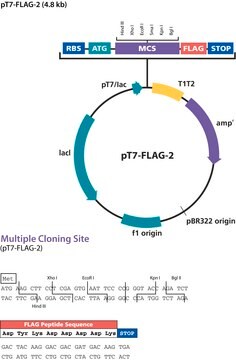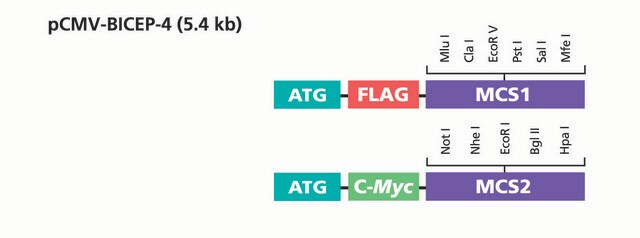E7029
pBICEP-CMV™-3 Expression Vector
Iniciar sesiónpara Ver la Fijación de precios por contrato y de la organización
About This Item
Código UNSPSC:
12171500
NACRES:
NA.56
Productos recomendados
Descripción general
The pBICEP-CMV-3 bicistronic expression vector is a 5.3 kb derivative of pCMV5 used for transient or stable co-expression of an N-terminal 1´ FLAGÒ fusion protein and a selection gene in mammalian cells.
Aplicación
For transient, cytoplasmic expression of an N-terminal FLAG® fusion and a second gene of interest or selection marker from bicistronic mRNA. Two genes can be cloned into MCS1 and MCS2 for transcription of a single message from the CMV promoter. This vector is useful for protein-protein interaction studies, multi-subunit proteins, and cloning a selection marker of choice.
Acciones bioquímicas o fisiológicas
The presence of two multiple cloning sites not only allows the user to clone a target gene, but a selectable marker of their choice, as well. The promoter-regulatory region of the human cytomegalovirus immediate early promoter drives transcription of the FLAG-fusion construct along with a downstream selection gene. The EMCV IRES region controls translation of the selection gene by recruiting the ribosomal subunits for cap-independent translational initiation. Depending on the mode of selection, stable transfectants can be generated by transfection using the appropriate ESCORTä product line specific for the cell type.
Otras notas
Browse additional application references in our FLAG® Literature portal.
Información legal
FLAG is a registered trademark of Merck KGaA, Darmstadt, Germany
pBICEP-CMV is a trademark of Sigma-Aldrich Co. LLC
Producto relacionado
Referencia del producto
Descripción
Precios
Código de clase de almacenamiento
10 - Combustible liquids
Clase de riesgo para el agua (WGK)
WGK 3
Punto de inflamabilidad (°F)
Not applicable
Punto de inflamabilidad (°C)
Not applicable
Equipo de protección personal
Eyeshields, Gloves
Certificados de análisis (COA)
Busque Certificados de análisis (COA) introduciendo el número de lote del producto. Los números de lote se encuentran en la etiqueta del producto después de las palabras «Lot» o «Batch»
¿Ya tiene este producto?
Encuentre la documentación para los productos que ha comprado recientemente en la Biblioteca de documentos.
R J Jackson et al.
Trends in biochemical sciences, 15(12), 477-483 (1990-12-01)
The initiation of translation of picornaviral RNAs takes place by an unusual mechanism whereby ribosomes bind directly to an internal site rather than scan the RNA from the 5'-end. This internal entry mechanism requires a 450-nucleotide segment of the picornavirus
S K Jang et al.
Journal of virology, 62(8), 2636-2643 (1988-08-01)
Picornavirus RNAs are uncapped messengers and have unusually long 5' nontranslated regions (5'NTRs) which contain many noninitiating AUG triplets. The translational efficiency of different picornavirus RNAs varies between different cell-free extracts and even in the same extract, such as micrococcal
P L Hallauer et al.
BMC genetics, 1, 1-1 (2000-10-19)
Versatile transgenic manipulation of skeletal muscle requires knowledge of the expression profiles of diverse promoter/enhancer elements in the transcriptionally specialized fiber types of which muscle is composed. "Universal" viral promoters/enhancers, e.g., cytomegalovirus IE1 (CMV IE1), are of interest as reagents
S Andersson et al.
The Journal of biological chemistry, 264(14), 8222-8229 (1989-05-15)
The conversion of cholesterol into bile acids in the liver represents the major catabolic pathway for the removal of cholesterol from the body. In this complex biosynthetic pathway, at least 10 enzymes modify both the ring structure and side chain
D R Thomsen et al.
Proceedings of the National Academy of Sciences of the United States of America, 81(3), 659-663 (1984-02-01)
The DNA templates containing immediate early (IE) genes of human cytomegalovirus (CMV) were transcribed in vitro by using a HeLa cell extract. When IE region 1, 2, and 3 were used, transcription was detected qualitatively only from IE region 1.
Nuestro equipo de científicos tiene experiencia en todas las áreas de investigación: Ciencias de la vida, Ciencia de los materiales, Síntesis química, Cromatografía, Analítica y muchas otras.
Póngase en contacto con el Servicio técnico








